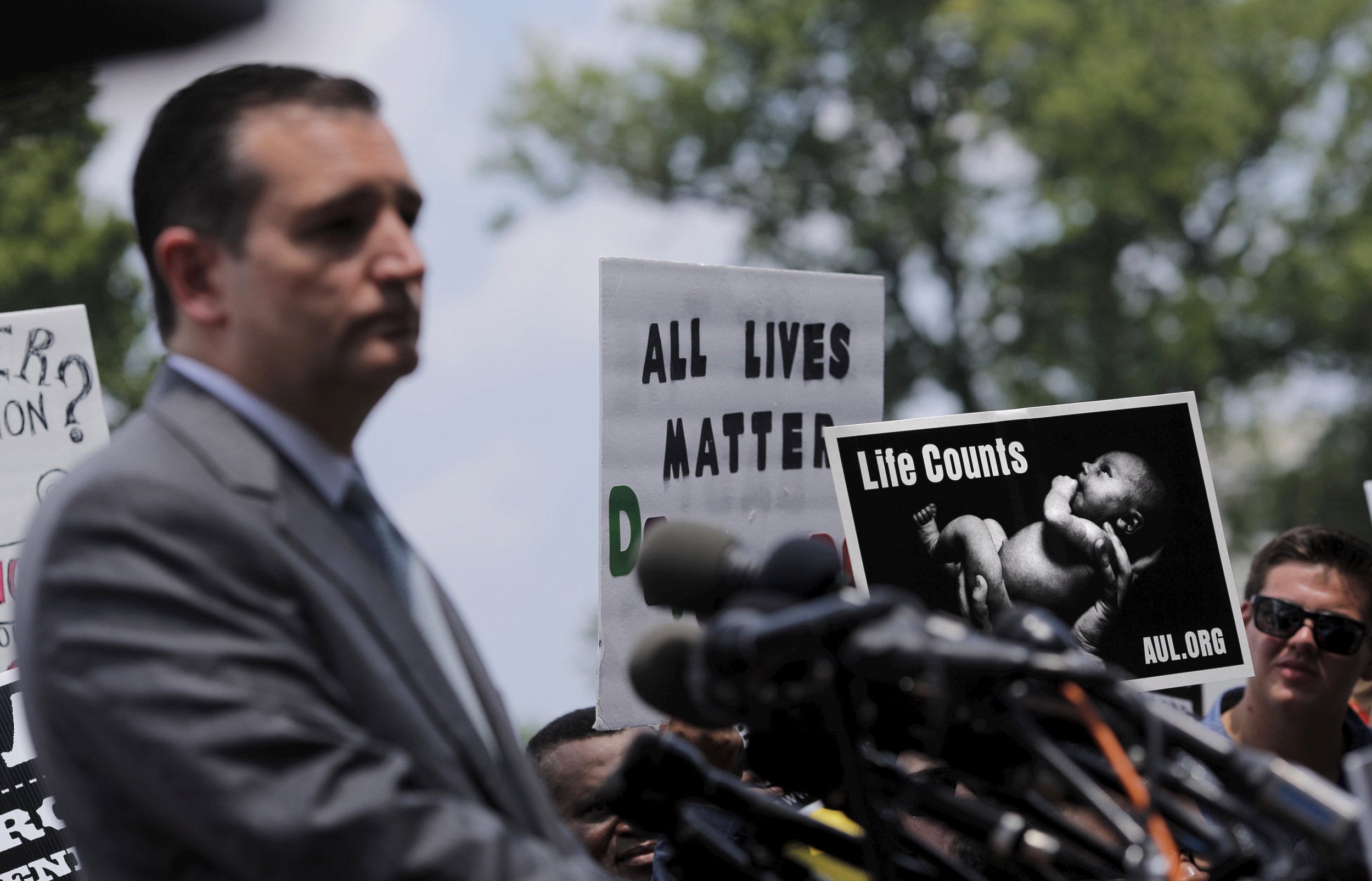
From Texas Senator Ted Cruz's standpoint, the political stars couldn't have aligned much better over the past year. First, in June 2015, the U.S. Supreme Court issued a landmark ruling legalizing gay marriage, then an anti-abortion group began releasing undercover videos about abortion and Planned Parenthood, creating an uproar within the anti-abortion movement and stirring a flood of new activity among activists. And if the stakes weren't high enough as the 2016 presidential race got underway, leading conservative jurist Antonin Scalia died in February, leaving the Supreme Court equally divided. The Republican primary environment was primed for a candidate like Cruz, a preacher's son whose presidential campaign was focused heavily on social issues and rallying hard right conservatives who felt their beliefs were under attack—promising to protect religious freedom and bar abortion with almost no exceptions.
But the culture war Cruz was fighting never caught fire the way his campaign was hoping. He lost every single state in the Deep South—a conservative stronghold—to a libertine billionaire, Donald Trump—a man who has openly discussed his playboy ways in the press over the years, and declared himself pro-choice less than a decade ago. Though Cruz managed to stay in the race longer than virtually every other Republican, the champion of the religious right couldn't catch the New York–based real estate tycoon, who won social conservatives and independents alike, from Biloxi to Brooklyn. Along the way, state-by-state exit polls showed sizable drops across the country in the rate of GOP primary voters whose priority was a candidate who "shares my values" compared to 2008, according to an analysis conducted by Newsweek.
Republicans are now about to nominate a businessman who has defended Planned Parenthood and criticized North Carolina's controversial transgender bathroom law (a position he's since walked back). Trump has tried to convince Republicans that he's a social conservative (most recently promising on Fox News that he will appoint anti–abortion rights justices to the Supreme Court), but that's not why people are voting for him—exit polls shows that Republicans who prioritized a candidate who "says what he believes" or "can bring change" were a plurality or even a majority in nearly every state. This, experts say, reflects a new sort of culture war that is actually a return to 19th and early 20th century battles over America's religious identity—but instead of white Christians targeting Catholic immigrants or Mormons, their ire is now turned on Hispanic immigrants and Muslims.
While the debate over "bedroom issues" like abortion and gay rights aren't going away—North Carolina's decision to sue the Justice Department in defense of its transgender law reinforces that—Cruz's loss to Trump, even in deeply conservative bastions, raises questions about the salience social issues still have for most Republican voters, when compared to the "clash of civilizations" that Trump is talking about. Is the "moral majority" now a minority in the GOP?
Neil Newhouse, a leading Republican pollster, says no. "This is a moment where the overwhelming kind of populist sentiment that we've seen among voters across the country has overcome…all the other options," he says, but calls 2016 "an atypical presidential primary season." That's an understatement. To Newhouse, then, "It's way too premature to declare that the social conservative in the Republican Party is dead."
To Newhouse's point, Newsweek's survey of 2016 exit polls shows that, if anything, Republican primary voters now identify as more deeply conservative than in 2008. And there's little sign that conservative are liberalizing their opinions on things like abortion and guns—rather the opposite. In the 1990s, Republicans went from divided on legalized abortion to strongly opposed, a position that has held relatively steady since. But there are some signs that those issues don't hold the same importance they once did. Gallup polling that asks voters about their top priorities for candidates shows that the percent of Republicans who consider abortion an "extremely" or "very important" issues has dropped in the last three election cycles, since 2012—from 46 percent to 43 percent to 34 percent in 2016.
There are also generational changes at work in terms of social attitudes, which suggests society is moving on from the touchstones of the culture wars launched in the '70s and '80s. And the Republican Party is not immune. There's been a remarkable rise in support for same-sex marriage over the past decade in the United States, including in the GOP. That shift is particularly pronounced among young people. The fight over Roe v. Wade—the 1973 Supreme Court decision legalizing abortion—remains a linchpin to the traditional pro-life movement, but a 2013 Pew Research Center Survey found that less than half of adults under the age of 30 even knew what the decision was about (compared to more than 60 percent among older age cohorts). The support for overturning Roe is also gradually shrinking, Pew finds, as more people become indifferent to the issue. And while just over half of American adults say abortion is "not that important" of an issue, that figure jumps to 62 percent among people under 30.
Some experts say there is indeed an attitudinal shift underway, which has benefited Trump. Stephen Prothero, professor of religion at Boston University, suggests that there has been a growing recognition among white evangelicals and other social conservatives, "that the bedroom culture wars have been lost." Conservatives don't expect the Supreme Court decisions that legalized gay marriage or abortion to be overturned at this point, though they can still rally to fight on the local level, a la North Carolina. Nationally, however, their focus is shifting to a different, more traditional kind of culture war, which is centered on the fight over Judeo-Christian values and who is a "real" American, says Prothero. These kinds of moral and religious culture wars have a long history in the U.S., starting with anti-Catholic and anti-Mormon movements of the 1800s, and usually have had "nothing to do with sex," he says. The bedroom element was only introduced in the contemporary culture wars of the 1970s and '80s.
"It's not that Trump is not a culture warrior. My God, he's a classic culture warrior," says Prothero. It's just that Trump's war is against Islam and Mexican immigrants, not abortion clinics.
University of Oregon professor Joseph Lowndes agrees that while social issues have not disappeared, the economic tumult of the past decade has resulted in voter priorities being refracted through "a very concentrated prism of race and class now." That didn't start with Trump, but with the financial crisis of 2007–2008. A 2008 study by the Ray C. Bliss Institute of Applied Politics at the University of Akron, for example, found "a very dramatic change in issue priorities across religious groups" compared with the 2004 election. Concern with economic issues surged in that cycle. Now the U.S. is, as Lowndes puts it, "many years into a second Gilded Age," reckoning with a yawning gap between the wealthy elite and the average American, so it's not entirely surprisingly that voters—even Republicans—are ever angrier, and ever more focused on the economy and inequality, not social issues and reproductive rights.
In other words, while Trump is in many ways a political anomaly, the nationalistic, populist currents he's riding are not—he's just been savvy enough to tap into them. And the grievance politics the mogul has perfected are not likely to end with him, even if he loses in November. The U. S., says Lowndes, is seeing "a transformation in how political divisions are being articulated."
"I think Trump is quite likely to lose in November," he continues, "but I think Trump-ism is not going anywhere." Welcome to the new (old) culture wars.
Uncommon Knowledge
Newsweek is committed to challenging conventional wisdom and finding connections in the search for common ground.
Newsweek is committed to challenging conventional wisdom and finding connections in the search for common ground.
About the writer
Emily spearheads Newsweek's day-to-day coverage of politics from Washington, D.C. She has been covering U.S. politics, Congress and foreign affairs ... Read more
To read how Newsweek uses AI as a newsroom tool, Click here.








